Monday, October 8th 2018

Intel Also Launches HEDT Core X Processors - 8 to 18 Cores on LGA 2066/X299
Intel today tried to burn the entire hardware media world with a flurry of announcements designed to make our fingers bleed. Alongside their mainstream desktop 9th generation series which goes up to the mainstream overclocker's dream i9-9900K (which is now available for pre-order on Amazon from $499), Intel also announced a new HEDT lineup in the form of the 9th Gen Core X series, which are still being fabbed on their 14 nm++ nodes.The Core X series comes as an answer to AMD's Threadripper-based HEDT lineup - which still wins in core-counts alone by an almost ungodly margin. However, Intel likes to put it this way: better fewer, stronger cores than more numerous, weaker ones. The new lineup spans the i7-9800X with its 8 cores and 16 threads running at 3.8 GHz base clocks with 16.5 MB of L3 cache all the way to the 18-core, 36-thread i9-9980XE, which runs at 3 GHz base clocks with 24.75 MB of L3 cache. Intel is also deploying their Turbo Boost Max tech which will allow its new CPUs to achieve higher boost clocks than with their Turbo Boost 2.0 - by 100 MHz. All Intel CPUs - from the 8 to the 18-core - feature a 165 W TDP, and will slot in on LGA 2066, X299 motherboards (don't forget your BIOS updates, though).
The new HEDT processors and Core X series supports quad-channel DDR4 memory, at a base speed of 2666 MHz - but as we all know, Intel platforms have been extremely apt in taking the most out of maximum DDR4 memory frequency. The new processors do away with one of the harshest criticisms that has been thrown Intel's way on how they handle their enthusiast or overclocking-geared CPUs - they've finally gotten rid of their TIM paste interface, and opted for soldering their CPUs for better thermal characteristics (and ultimately, higher clockspeeds/stability). Of course, now the company goes on to say what we all knew - that solder improves on performance achieved by TIM paste solutions. And even goes so far as using this change as a selling point. Oh, Intel.All new CPUs in the Core X series deliver up to 68 PCIe 3.0 lanes (44 delivered by the CPUs themselves, less than the 64 AMD's CPUs provide) and an additional 24 delivered by their PCH. Core X chips include hardening (both in silicon and microcode updates) against both Spectre and Meltdown vulnerabilities. And Intel delivered some performance numbers with their presentation, claiming 27% faster 3D rendering, 107% faster video editing, and 13% faster game build time (always up to, and always pitting Intel's $1,979 18-core, 36-thread i9-9980XE against AMD's $1990, 32-core, 64-thread Threadripper 2990WX).Interestingly, from an architecture perspective, Intel is carving these new CPUs from three different dies: LCC (low core count) and HCC (high core count), with the LCC die covering anything from 4-10 cores and the HCC die covering up to 18 cores. The L3 cache on these is of the non-inclusive, victim type - it only loads data that had already been discarded from the L2 cache for other, more priority-heavy data.
Source:
Tom's Hardware
The new HEDT processors and Core X series supports quad-channel DDR4 memory, at a base speed of 2666 MHz - but as we all know, Intel platforms have been extremely apt in taking the most out of maximum DDR4 memory frequency. The new processors do away with one of the harshest criticisms that has been thrown Intel's way on how they handle their enthusiast or overclocking-geared CPUs - they've finally gotten rid of their TIM paste interface, and opted for soldering their CPUs for better thermal characteristics (and ultimately, higher clockspeeds/stability). Of course, now the company goes on to say what we all knew - that solder improves on performance achieved by TIM paste solutions. And even goes so far as using this change as a selling point. Oh, Intel.All new CPUs in the Core X series deliver up to 68 PCIe 3.0 lanes (44 delivered by the CPUs themselves, less than the 64 AMD's CPUs provide) and an additional 24 delivered by their PCH. Core X chips include hardening (both in silicon and microcode updates) against both Spectre and Meltdown vulnerabilities. And Intel delivered some performance numbers with their presentation, claiming 27% faster 3D rendering, 107% faster video editing, and 13% faster game build time (always up to, and always pitting Intel's $1,979 18-core, 36-thread i9-9980XE against AMD's $1990, 32-core, 64-thread Threadripper 2990WX).Interestingly, from an architecture perspective, Intel is carving these new CPUs from three different dies: LCC (low core count) and HCC (high core count), with the LCC die covering anything from 4-10 cores and the HCC die covering up to 18 cores. The L3 cache on these is of the non-inclusive, victim type - it only loads data that had already been discarded from the L2 cache for other, more priority-heavy data.
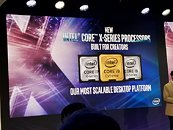
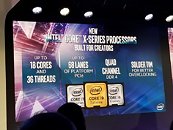
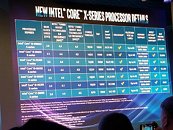
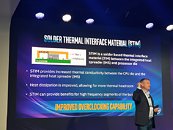
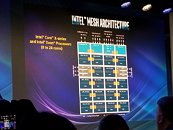
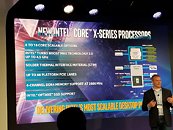
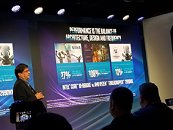
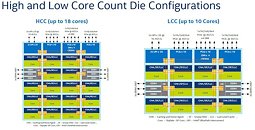
22 Comments on Intel Also Launches HEDT Core X Processors - 8 to 18 Cores on LGA 2066/X299
Pricing is extremely arrogant and ignorant of 2018's doings in the HCC market. This is almost offensive towards customers who know much CPU power you can buy for a a certain price.
I know that not all cores are created equal, but there's only so much you can charge for having a premium product over your competitor.
Intel, you were given a second opportunity at pricing those. You know very well what's going on at the HEDT market, yet 10C for 999$ and 20C for 1999$ was still a go.
This is not cool, Intel. And your opponent doesn't even have to react in order to pull customers this time.
:shadedshu:
Looks like X58 aint gonna be replaced this season then either then. Cause i do want intel again but as long there CPU´s cost like they do now and X58 can keep me going that is what i will do. So i will be on X58 for at least a year more then.
Also, are these new CPUs Skylake-X 14+ nm or Cascade Lake-X 14++ nm?
Atm, I don't care personally though. I'm just glad x299 will have more life in it down the road.
Intel's product line becomes ever more convoluted and confusing.
They are all i9s
They all have 40 pcie lanes on chip
No nonsense 4-6C chips
That's good.
What's not good is the pricing, that should start at 499$ and end at roughly 1099$ IMO.
www.amazon.com/dp/B005404P9I/ref=sr_1_3?ie=UTF8&qid=1539066128&sr=8-3&keywords=intel+i9+9900k
Looks like it's 530$ now and price it's climbing due to best seller status...
They have 44 lanes, same as previous gen from 10-18 cores parts. Just the 8 core part got more lanes.